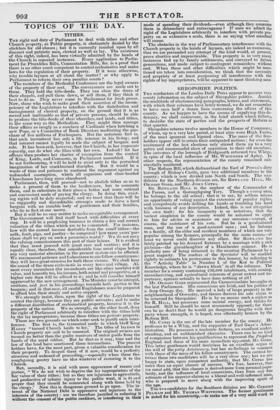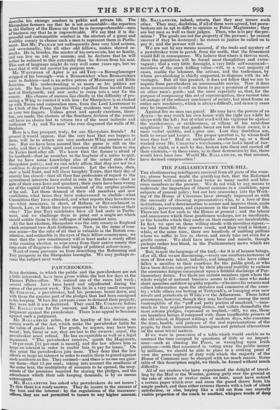SHROPSHIRE POLITICS.
THE conductors of the London Daily Pthss appear to possess very scanty information on the subject of Shropshire politics. Amidst the multitude of electioneering paragraphs, letters, and statements, with which their columns have lately teemed, we do not remember to have seen half a dozen lines concerning the affairs of this county. As we happen to have the means of supplying this de- ficiency, we shall endeavour, in the brief sketch which follows, to describe the state of parties and the prospects of Reform in that quarter.
Shropshire returns twelve members to the House of Commons; of whom, up to a very late period, at least nine were High Tories, of the most ignorant and bigoted class. The mass of the free- holders appear still to retain their antiquated notions ; for even the excitement of the last elections only stirred them up to a very paltry and unsuccessful show of opposition to their old members. The outvoters of the borough of Bridgnorth returned two Whigs, in spite of the local influence of Mr. WHITMORE of Apley. In other respects, the representation of the county remained sub- stantially unaltered.
The Reform Bill, which disfranchised the Earl of Powis's dirty borough of Bishop's Castle, gave two additional members to the county; which is now divided into North and South. The can- didates for the Northern division are, Sir ROWLAND HILL, Mr. ORMSBY GORE, and MT. JOHN COTES.
Sir ROWLAND HILL is the nephew of the Commander of the Forces, and a thoroughgoing Tory. Though a young man, he belongs to the old school ; that is to say, he sell= misses an opportunity of voting against the extension of popular rights, and scrupulously avoids defiling his hands or troubling his head with business of any description. Indeed, this is not altogether his own fault; for his incapacity is so notorious, that the veriest simpleton in the county would be ashamed to apply to him for advice or assistance on any occasion—except, of course, the assistance of his vote. But he is a goodnatured man, and the son of a good-natured man ; and he belongs to a family, all the elder and resident members of which are very popular among the farmers, principally for the same cause,—at least we never could discover any other. Sir ROWLAND has lately patched up his decayed fortunes by a marriage with a rich plebeian—the granddaughter of a Manchester spinner. He is perfectly sure of being returned to the ensuing Parliament by a great majority. The readers of the Spectator will be enabled rightly to estimate his pretensions to this honour, by referring to the " Activity Table" in Number I. of the Key to Political Knowledge, where he is "drawn blank" in all the columns. The member for a county containing 222,000 inhabitants, with mining, manufacturing, and agricultural interests of great extent and im- portance, appears actually to have done nothing at all ! Mr. ORMSBY GORE represented the Carnarvonshire boroughs in the last Parliament. His connexions are Irish, and his politics of a deep Orange dye. He married a lady of large property in the neighbourhood of Oswestry, and thence derives his sole claim to be returned for Shropshire. He is by no means such a cipher as Sir R. HILL, but possesses some mental energy, and thinks for himself. Still he should be most strenuously opposed; for there can be no doubt that be would go dangerous lengths with that party whose strength, it is hoped, was effectually broken by the Reform Bill.
Mr. COTES is the son of the late member for the county. He professes to be a Whig, and the supporter of Earl GREY'S Admi- nistration. He possesses a moderate fortune, an excellent under- standing, and an unblemished character. There can be no kind. of comparison between his qualifications to represent the People of England and those of his more immediate opponent, Mr. GORE. This latter gentleman would doubtless be an excellent organ of the will of the petty Aristocracy, but has no feelings in common with those of the mass of his fellow-countrymen. The contest be- tween these two candidates will be a very close one; but we are happy to state, upon competent authority, that Mr. COTES has more than an equal chance of success. We fear, however, that we must add, that this chance is derived more from personal popu- larity, and the influence of local connexions, than from any due estimate of his superior claims as a liberal and well-informed man, who is prepared to move along with the improving spirit of the age. The two candidates for the Southern division are Mr. CRESSET PELHAM and Mr. THOMAS WHITMORE. The former gentleman is rioted for his eccentricity,—to make use of a very mild word to ilescribe his strange conduct in public and private life. The Shropshire farmers say that he is not accountable—the reporters in the Gallery of the House say that he is incomprehensible—men ,of business say that he is impracticable. We say that it is dis- graceful and contemptible conduct in the electors of a great and wealthy county to choose such a man to represent them in Parlia- ment. But Mr. PELHAM not unfrequently does very kind actions, and occasionally, like all other odd fellows, makes shrewd re- marks. He is, besides, the master of his own estate, has no family, and can live on 50/. per annum; and he declares that he will rather be reduced to this extremity than be driven from his seat. This sort of language might do very well some years ago, but we trust that it will not answer his purpose now.
Mr. WHITMORE of Apley is an old Tory—a Boroughmonger stripped of his borough—was a Brunswicker when Brunswickers were in fashion—and is an active patron of Missionary and Bible Societies. His understanding is as ,mean as his politics are slavish. He has been ignominiously expelled from his old family nest at Bridgnorth, and now seeks to creep into a seat for the county. His chance of success lies chiefly in the difficulty of pro- curing a Whig to contest it with him : for Shropshire is so choked up with Tories and corporation men, from the Lord Lieutenant to the Clerk of the Peace, that the Whig residents may be counted on your ten fingers. Unless great and speedy exertions, there- fore, are made, the electors of the Southern division of the county will have no choice but to return two of the most imbecile and inefficient "Ay and No men" who ever disgraced the walls of St. Stephen. Here is a fine prospect, truly, for our Shropshire friends ! At present it would appear, that the very best that can happen to them, will be to return one very moderate Whig member out of four. But we have been assured that the game is still on the cards, and that a little spirit and exertion will enable them to run the Tories hard after all. We know that the farmer is afraid of his landlord—that he crouches to the bugbear of a notice to quit. But we have some knowledge also of the actual state of the Shropshire gentry, and we can safely affirm that they are not in a condition to dispense with good tenants. Let the electors, then, show a bold front, and tell these haughty Tories, that their day of misrule has closed—that all their fine professions of regard to the agricultural interests have ended in ruin to the farmers—that in spite of their corn-laws and quackery, their rents have been wrung out of the capital of their tenants, instead of the surplus produce of the soil. Let them demand of their old members and new candidates, what taxes they have endeavoured to abolish—what Committees they have attended, and what reports they have drawn up—what measures, in short, of Reform or Retrenchment in Church, Law, or State they have supported by their voices or their votes? The four Tory candidates have all had seats in Parlia- ment, and we challenge them to point out a single act which should entitle them to the suffrages of independent men. At the last election, Shropshire was the only county in England which returned two Anti-Reformers. Now, in the name of com- mon sense—for the sake of all that is valuable in the British con- stitution, and estimable in the eyes of their fellow-countrymen, we trust that the new constituency will at least make a sturdy effort at the ensuing election to wipe away from their native county this deep stain of disgrace—this foul badge of political subserviency. Want of room prevents us from describing the Reforming and Tory prospects in the Shropshire boroughs. We may perhaps re- sume the subject next week.



























 Previous page
Previous page